
We kindly inform you that, as long as the subject affiliation of our 300.000+ articles is in progress, you might get unsufficient or no results on your third level or second level search. In this case, please broaden your search criteria.


Suriyeli sığınmacıların Türkiye’ye adaptasyonlarının sağlanması ve asgari yaşam standardı elde edebilmeleri için çalışma haklarına erişimleri sağlanmalıdır. Sığınmacıların çalışma izni almasında uygulamada büyük sorunlar çıkmaktadır. Suriyeli sığınmacıların çalışma izinleri süreci, başlangıçta özel bir hukuki düzenlemenin yokluğu ve düzenlemelerin çıkarılması ardından ise çıkarılan yönetmeliklerdeki hükümlerin belirsizliği ve uygulanmasında yaşanan problemler nedenleriyle halen sıkıntılıdır. Yabancıların çalışma izni alması, genel itibariyle zorlu bir süreç iken, söz konusu yabancı bir mülteci veya sığınmacı olduğunda, daha da zorlaşmaktadır. Suriyeli sığınmacılar genel olarak YUKK m. 91’de düzenlenen geçici koruma kapsamında korunmaktadırlar. Geçici koruma sağlananlar için çalışma izinleri ayrıca Geçici Koruma Yönetmeliği m. 29’da ve bu madde doğrultusunda çıkarılan “Geçici Koruma Sağlanan Yabancıların Çalışma İzinlerine Dair Yönetmelik”’te özel olarak düzenlenmektedir. Ancak hem bu düzenlemelerde boşluk olan durumlarda genel çalışma izni hükümlerine referans verilmesi hem de yabancıların ile 1951 BM Mültecilerin Hukuki Statüsüne İlişkin Sözleşme kapsamında ve YUKK m.61 kapsamında korunan mültecilerin durumu ile kıyasla değerlendirilebilmesi için, öncelikle genel hükümlerden bahsedilmesi yararlı olacaktır. Ardından Geçici Korunan Yabancılar için getirilen özel hükümler incelenerek, son olarak uygulamada çıkan bazı sorunlar, mevzuat ışığında değerlendirilecektir.
More...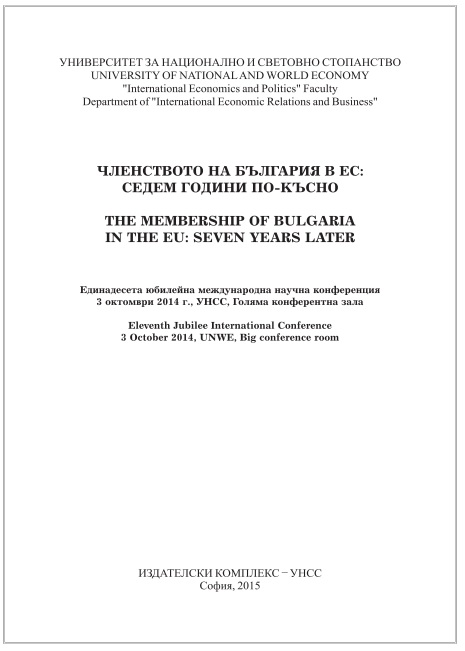
This book collects scientific papers and reports presented on the conference ‘The Membership of Bulgaria in the EU: Seven Years Later’ organized by the International Economic Relations and Business Department at University of National and World Economy (UNWE), Sofia, Bulgaria. The conference, held on 3 October 2014, traditionally provided a stage for prominent academics, dedicated PhD students and professionals to discuss contemporary topics related to multiple aspects of the European integration, its effects on the Bulgarian economy, socio-economic environment, international business and relations, finance and politics. The authors in this edition of the book thoroughly reviewed the economy of the Euro area and the EU as it progresses after the latest recession. A Group of authors focuses attention on the banking sector, monetary aspects and inflation, the development in the Economic and monetary union within EU, the Single Supervisory Mechanism and the overall competitiveness and recovery of the European markets. Cross-border partnership with EU neighbours and related instruments, cohesion among the EU member states, experience with the European funds and corresponding public procurement process are another thematic cluster discussed in the book. The researchers increasingly examine subjects related to the energy policy and security, the EU energy policy development and actions in particular. The contributors review matters related to the renewable energy sources, the establishment of the European Energy Union and other institutional and policy developments on supranational level. Another thematic cycle in the book is related to matters concerning the corporate management, business strategy and marketing, new markets expansion and interculturalism. This is intertwined with papers dedicated to the education, human resource involvement and adaptation to the working environment, research and innovation. ‘The Membership of Bulgaria in the EU: Seven Years Later’ is an annually organized academic event with the vision to foster open dialogue, offer contemporary research and exchange of ideas between fellow academics, policy makers, businesses, stakeholders and the public.
More...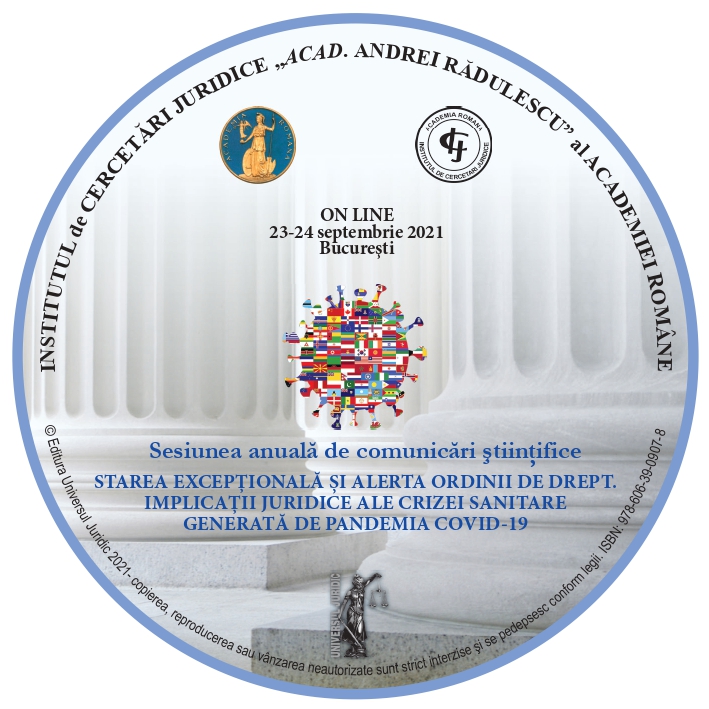
The year of grace 2020 brought a unique situation for our society, in the context of pandemic situations never seen before by contemporaries. The danger of losing one's life but also the fear of the unknown has determined and continues to determine a state of insecurity that is fundamentally reflected in all areas of society. Of course, the sphere of trade could not be avoided, this very important area of the economy being severely affected by all the measures that have been taken to combat, limit and prevent the spread of the virus. Thus, the commercial contracts suffered, the non-executions of the contract being very common, just as the delays or non-conformities increased. Also effects on trade were the decreases in the number of transactions and the clientele that used the goods/services of traders, given the travel limitations and restrictions imposed during emergencies and/or alerts.
More...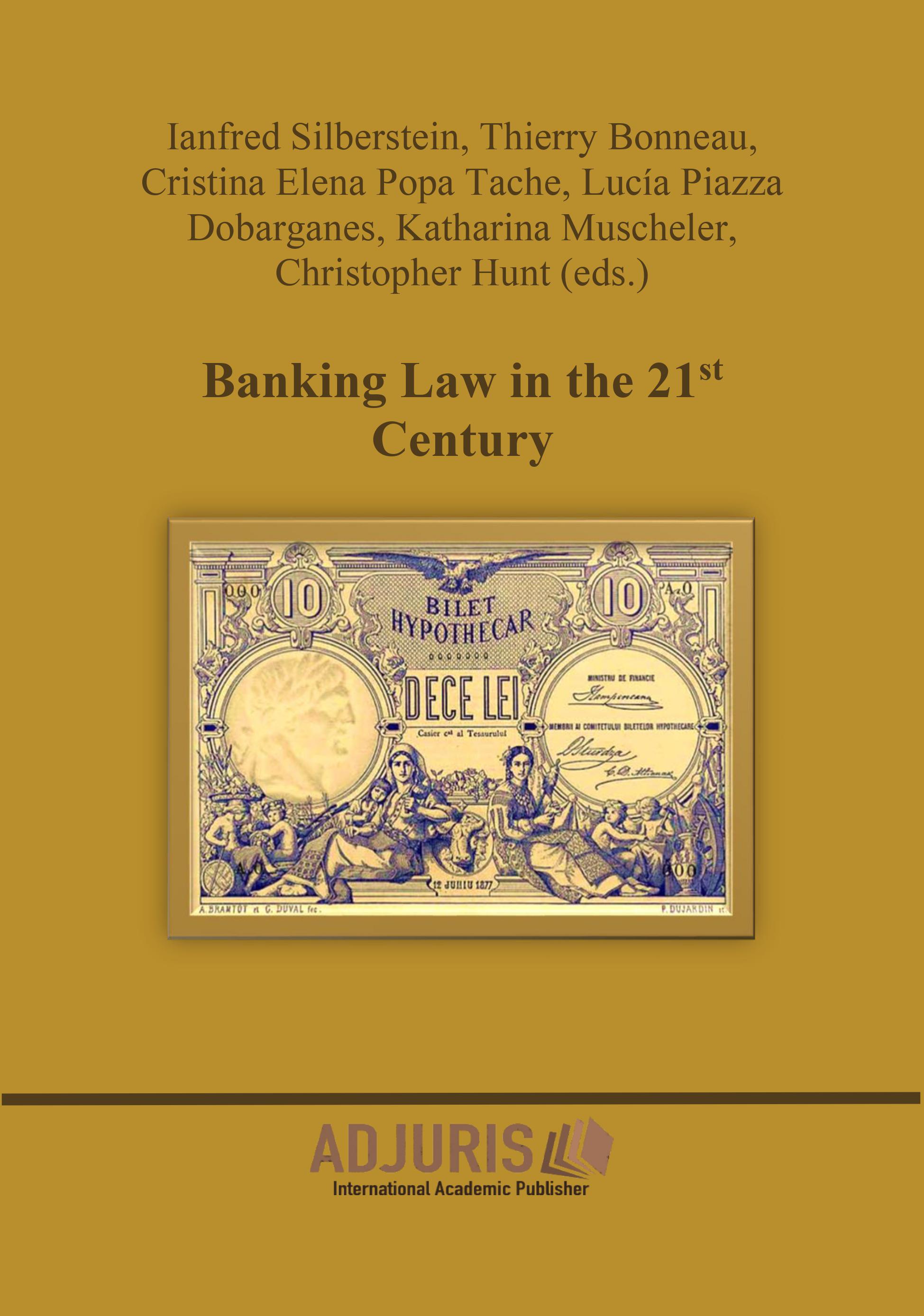
The paper presents the arguments of the Court of Justice of the European Union (CJEU) in case Dietrich (C-422/19) and case Weiss (C-493/17), which concern the analysis on the compliance of the national law and regulations adopted by the European Central Bank (ECB) with the primary sources of European law (Treaty on the Functioning of the European Union - TFEU) and with the mandatory rules of the Statute of the European System of Central Banks (ESCB). Pending disputes, both in Germany, have reopened the subject previously discussed in the case Gauweiler (C-62/14), concerning the adoption of rules alleging that monetary policy limits have been exceeded and that the ban on monetary financing has been infringed (Article 123 TFEU). In the case Dietrich CJEU examined the concept of means of payment accepted in the euro area, in the case Weiss there is an analysis on the program of acquisition of the public sector in secondary markets, formally adopted and implemented for more than three years, while case Gauweiler verified the conformity of the program for the purchase of government securities issued by euro area Member States. The paper reveals the competence of the CJEU to verify the rules by which monetary policy measures are implemented and it proves the extension of the EU monetary policy effects outside the euro area, through the influence of the CJEU jurisprudence in the legal system of all Member States.
More...
With the Communication from the Commission, entitled "Single Market Act" of 2010, on the Europe 2020 Strategy, the issue of the internal market is relaunched by the European Union institutions. The field of progress of the internal market is oriented towards the digital single market - PUD. The European Union is thus becoming a digital player, which means for the Member States a transformation and adaptation to the information society. A key role in the completion of the digital internal market is played by the Commission, which has tabled numerous legislative proposals since 2010, in parallel with the European Parliament, which has adopted a number of resolutions to this effect. In the context of these regulatory concerns, many questions are emerging about how the digital single market responds to the needs of citizens, businesses and beyond.
More...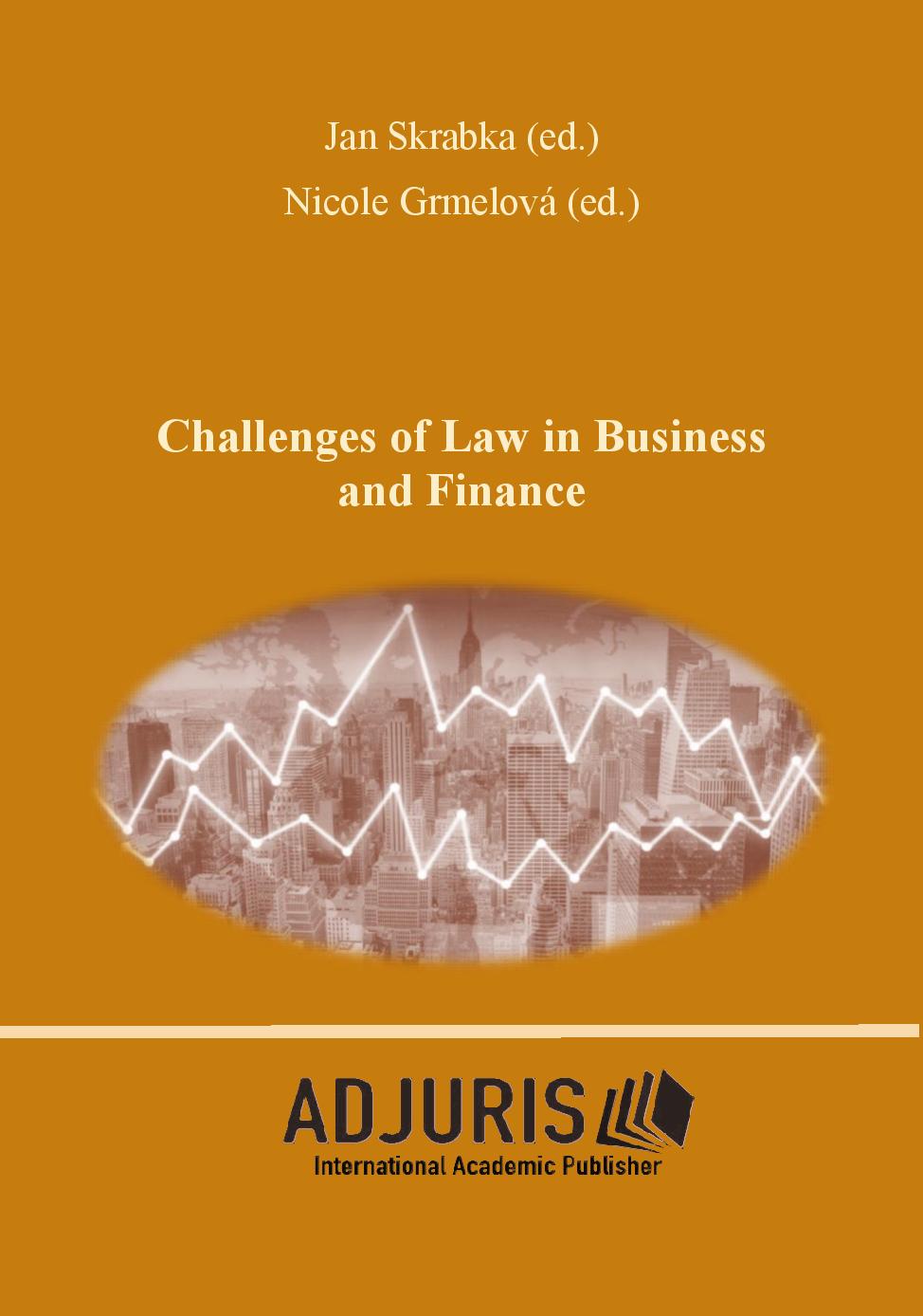
The Slovak Act on the Protection of Competition prohibits the public authorities from restricting competition by providing evident support giving advantage to certain entrepreneurs, or in any other manner. This national regime of protection against anticompetitive interventions by public authorities evolves alongside the European one. The issue of a normative administrative act, the issue of an individual administrative act (or failure to issue such act, where it should have been issued), adoption of decision by a representative body or conclusion of a contract were identified as vectors of unlawful intervention into competition. The creation of a situation of inequality of income, costs or obligations of undertakings (or tolerating such situation), the creation of barriers to the participation in the market or giving advantage to certain undertakings in their competitive or supplier/customer relations were declared as having anticompetitive effect.
More...
The paper deals with pricing algorithms in the context of competition law. Antitrust authorities around the world are concerned about the fact that pricing algorithms with even relatively low level of sophistication tend to cooperate without specific instructions, what may lead to their tacit collusion challenging current antimonopoly regulation. Negative impact may be seen in prices set above the market level and suppressed competition which may bring damage to consumers. Current legislation is not prepared for such technological advancement. The paper provides an overview on possible solutions for taking autonomous pricing algorithms under control.
More...
The aim of this paper is to showcase the Czech and EU law that regulates supply of digital content and services and assess its general usefulness with regards to contractual practice and consumer protection. This is achieved primarily by analysing the present and upcoming law that regulates the said topic and its comparison with con- tractual practice on the market. The paper concludes, that in the digital market, consumers have little control over the contracts they can enter into. Many of these contracts are consumer-unfriendly or even illegal. The law offers several ways the consumer can de- fend their rights on the market, but these are not cost-effective.
More...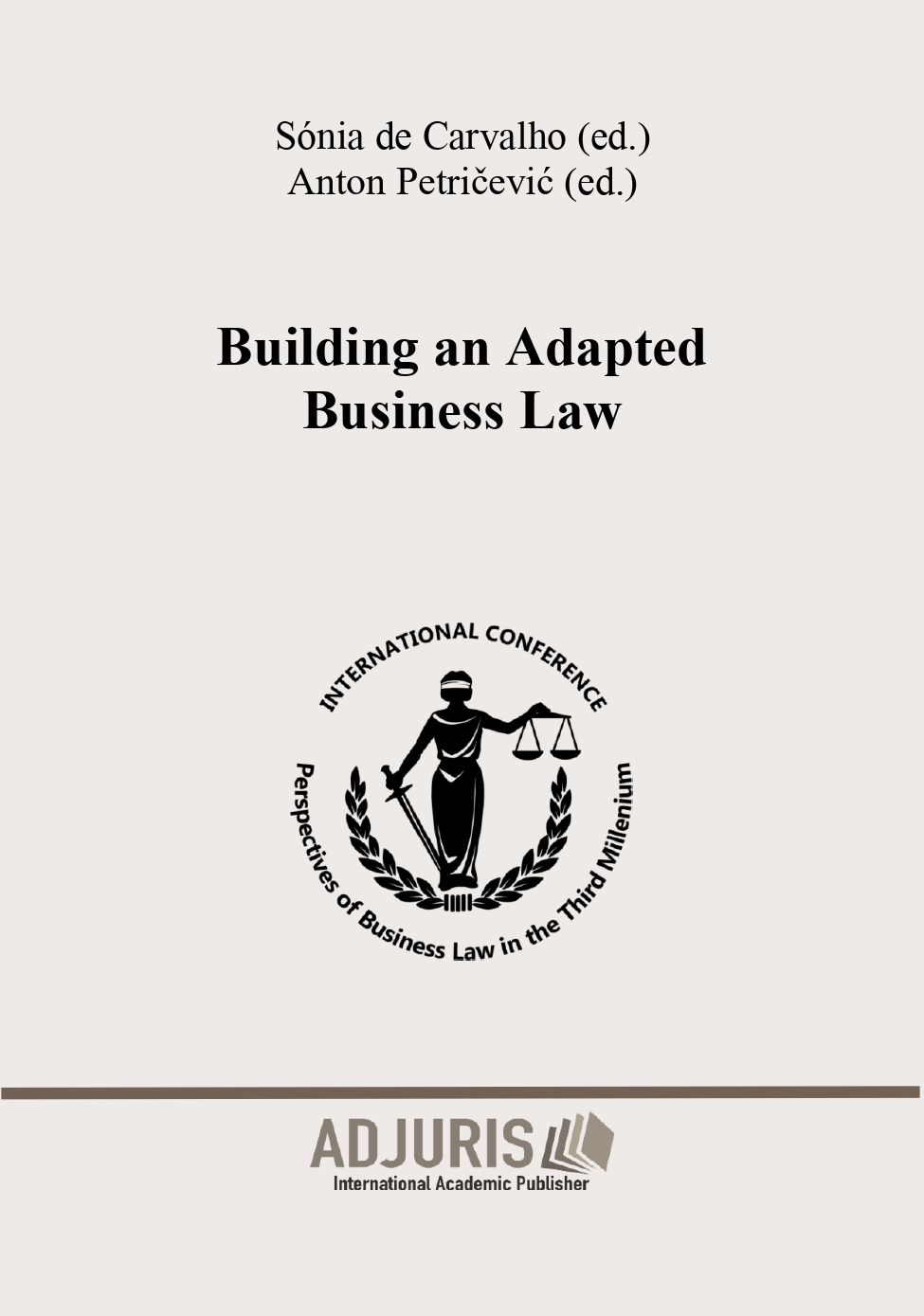
Any processing of personal data should be lawful and fair. GDPR provides rules relating to the protection of natural persons with regard to the processing of personal data and rules relating to the free movement of personal data. In is well known that a real estate transaction (regardless if it is an asset or a share deal), implies processing some personal data. This is applicable also for the legal persons involved in real estate transaction. This article aims to answer to some relevant questions related to the restrictions imposed by the GDPR in the context of a real estate transaction of whatsoever type.
More...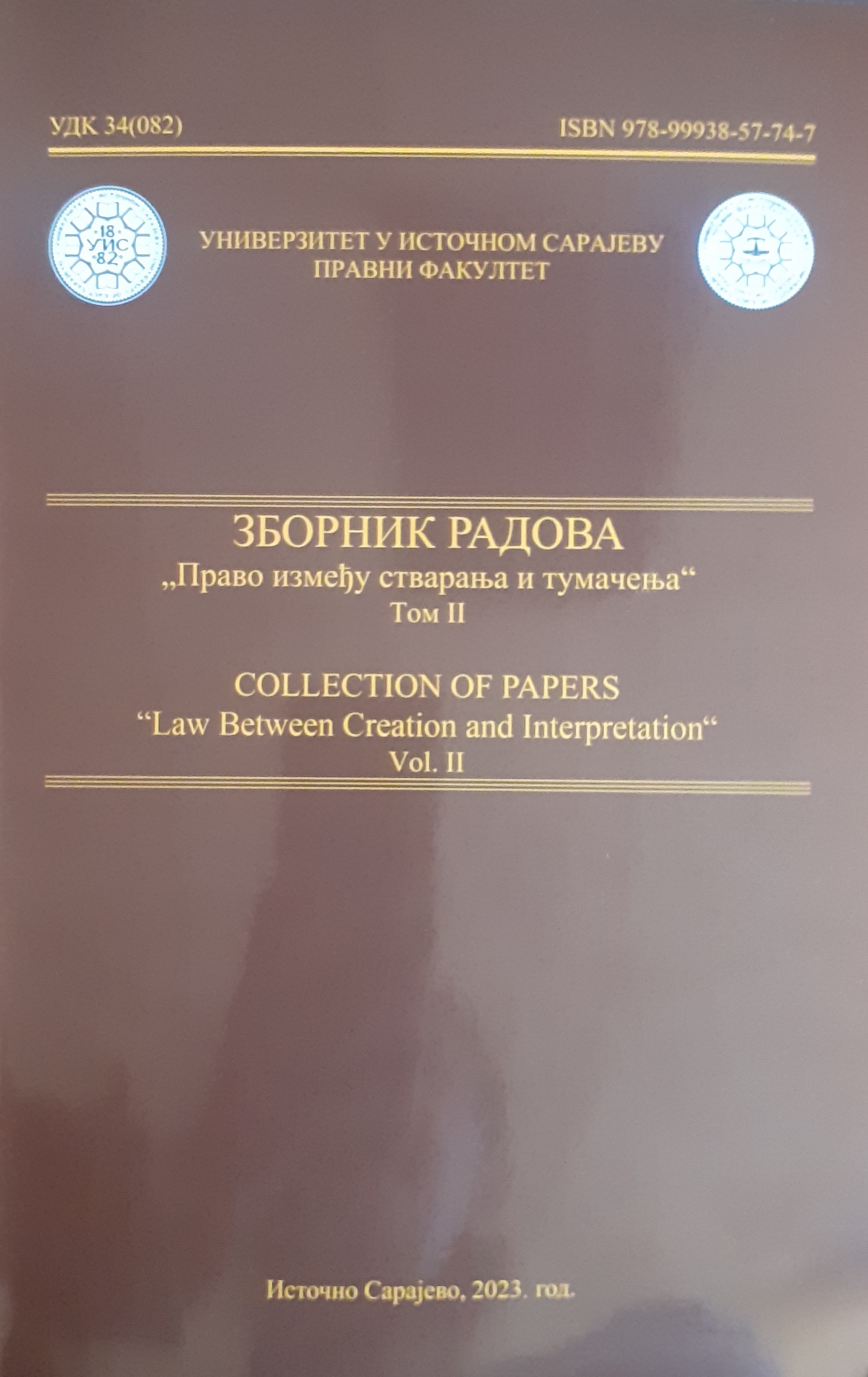
Regarding consumer protection, a crucial question is who the consumer can approach to enforce their rights due to defects in the purchased goods. In this study, we will delve into the entities accountable in situations involving defects in goods as outlined in the legal framework of Bosnia and Herzegovina (BiH). As BiH operates under two distinct laws for consumer protection, namely the Law on Consumer Protection of BiH and the Law on the Consumer Protection of Republic of Srpska (RS), we will ascertain whether consumers on the entire territory of BiH are afforded an equivalent level of protection in such scenarios. We will underscore the necessity of aligning regulations across BiH and assess their compatibility with EU directives designed to safeguard consumers as a distinct category of purchasers. Furthermore, we will put forth recommendations for enhancing consumer protection, particularly concerning the responsible parties in cases involving material defects.
More...
Every newly conquered or at least touched border, in all spheres of society, is characterize by the lack of laws that would regulate that "newly conquered territory". In the past, lawmakers had to face and obey the challenges arising from specific social conditions and specific communities or nations. International law bridged the gap, but it often took years and decades for a particular legal norm to be formulated, agreed upon, and put into effect. But it was so before and during industrial revolution, before technology began to guide us, our society and our institutions; before our dependence on a world governed by computers and the Internet began, in which man had to find his place, prosperity and well-being. In the meantime, the Internet has developed to unprecedented proportions, leading to the emergence of E-commerce, which brought about a revolution in providing commercial services. The creation of law is a complicated and slow process, and technological advances are to rapid, so there is a problem and a dilemma: can law keep pace with the dynamic changes and development of information and communication technologies? Every new law that governs the relationships arising from new technologies quickly becomes obsolete, and there is a need for its revision and modification., and so on, ad infinitum. This contributes to the creation of legal norms that are too broadly set or imprecise to be lasting, which in turn increases legal uncertainty, which then, inversely proportionally, affects the trust among entities that participate in E-commerce. Also, technical achievements create certain practical standards much faster than the law is able to regulate them. Therefor, a standard de facto becomes a norm long before the law normatively supports such a standard.
More...
The decision of the US Supreme Court in Impression Products v. Lexmark Int'l. sets a precedent and establishes a regime of international patent exhaustion in the US. According to this ruling, a patent holder who sells a product exhausts the patent authority on that product, regardless of any restrictions it intends to impose on the product or the location of the sale. This ruling significantly weakened the position of US patent holders. The ban on post-sale restrictions in Impression Products is a crude instrument compared to the justifications offered for it. In its favor, the rule of per se exhaustion on sale is simple and easy to understand, but because it is categorical, it does not distinguish the harmful effects of post-sale contractual restrictions from the many beneficial ones. US antitrust law on limited distribution began similarly, adopting categorical rules per se that changed and eventually gave way to nuanced treatment under the rule of reason. An examination of the types of contractual restrictions imposed in patent exhaustion cases indicated that they are used for different purposes and with different effects. Therefor, introducing a complete ban on imposing post-sale restrictions come in various forms, with different effects on competition or innovation. The system of rules for reviewing and enforcing such restrictions must take these differences into account, and patent laws should include provisions that should be sensitive to the different market situations in which patents may arise. by introducing a complete ban on contractual restrictions on products and the international patent exhaustion regime, US Supreme Court significantly changed the previous practice of lower courts and allowed parallel trade. Therefor, it significantly affects the business practice of economic entities in the USA, which will have to change the current concepts of placing products on the market that are covered by patent protection.
More...
This chapter presents the legislation and basic concepts related to the budgetary process in Bulgaria. The main stages associated with the approval of the state budget in Bulgaria are analysed. The budget process is a phased process where the different stages are: drawing up of the draft budget, adoption, implementation, and approval of the report on implementation of the State Budget. The main elements related to each of the stages of the budget process are presented. The timeframe of the process is summarised. The chapter also provides a characterization of all parties involved in the process. The essence of the budgeting programme is also presented. The role and significance of the Fiscal Council of Bulgaria are highlighted, along with the commitments that the Council has in relation to the budgetary process.
More...
The legislation of the European Union (EU) is a complex system that encompasses a wide range of legal acts and regulations. The EU legislative process involves several institutions, and the laws adopted at EU level are binding on all member states. The purpose of this chapter is to present an analysis of the legislative framework of the budgetary process at European Union level. Issues related to key principles of the EU, the Multiannual financial framework and the Annual budget of the EU as well as the 2021–2027 long-term EU budget and the next generation instruments for EU recovery are also analysed.
More...
This chapter introduces the concept of sustainable finance and its underlying principles adopted by financial institutions and investors. The exploration encompasses international and European Union initiatives aiming to establish a standardised framework for sustainable finance. Strategic regulations, such the Taxonomy for sustainable activities applied in the European Union and its member states, are reviewed as well. Learning to navigate through core tenets, regulations and sustainable finance instruments provides a comprehensive understanding of the risks and opportunities associated with fostering sustainability within the financial sector.
More...
This chapter presents the key aspects of financial control and audit in the public sector. ‘Financial Control’, ‘Supervision’ and ‘Audit’ are presented within the fourth component of the subject of legal regulation of Financial Law, stemming from their nature and legal regulation in positive law.
More...
This chapter presents the key aspects of protection of the financial interests of the European Union, including the relevant legal and institutional framework, theory and practice of irregularities and financial corrections, issues related to implementation of the Recovery and Resilience Facility, rule of law and the management of EU Funds
More...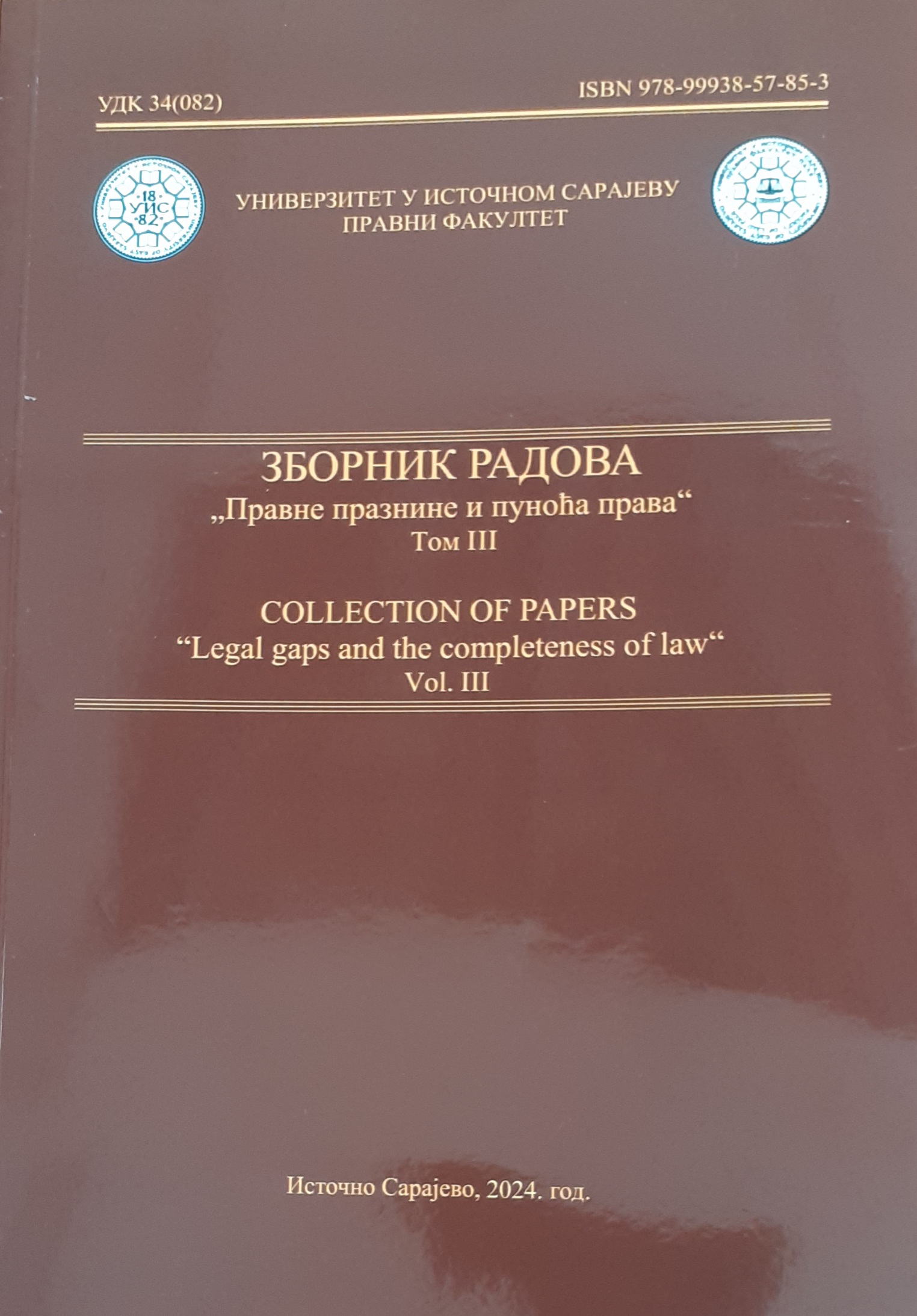
A bankruptcy proceeding is a special type of civil court proceeding and is conducted by the court which has subject matter and territorial jurisdiction in the area where the registered office of a legal entity or the residence of an individual debtor is located. In this paper, the authors explore the relationship between bankruptcy proceeding and civil proceeding regarding the determination of subject matter jurisdiction and territorial jurisdiction for bankruptcy cases, as well as the attraction of civil proceedings regarding territorial jurisdiction. The paper focuses on the analysis of legal regulations concerning subject matter jurisdiction, general delegation, and comparison with the aim of prescribing de lege ferenda regulations for the establishment of specialized commercial courts for commercial cases and bankruptcy proceedings in the Federation of Bosnia and Herzegovina.
More...
The pre-contractual information duty of electronic commerce contract is quite distinctively stipulated in different legal systems. In the European Union, according to the Directive 2000/31/EC, the Directive on Electronic Commerce, a large amount of necessary information of three levels is required to be published or provided to the receivers of information society services. In the process of incorporating of this Directive, Italy, France and Germany followed distinct paths and even designed distinct rules. Apart from the rules related to the Directive, the civil codes of member states stipulate a general pre-contractual information duty towards the conclusion of every single contract, while the consumer protection laws, or the codes of consumption, regulate this duty at the scene of contracting with consumers. On the contrary, in China, the Electronic Commerce Law dispersed the normative group of that duty in several sections but in less detail. Furthermore, the Civil Code and the Consumer Protection Law have established a number of universal rules. The administrative measures and judicial decisions act as an indispensable supplement, completing the normative system about that duty and reflecting a rather unique thought of regulation in the field of e-commerce.
More...